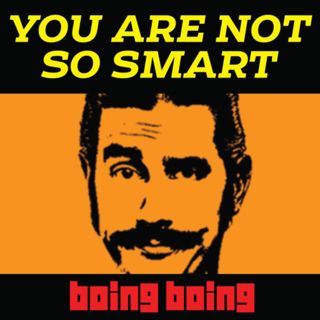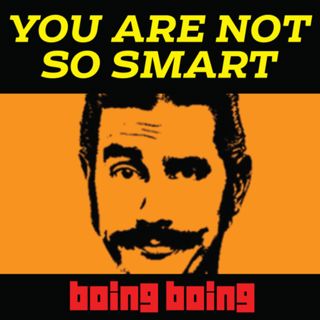
023 - Inbetweenisode 4 - The Illusion of Asymmetric Insight
In the 1950s, in an effort to better understand group conflict, a team of psychologists nearly turned a summer camp into Lord of The Flies. The story of how and why it was so easy to turn normal boys into bloodthirsty, warring tribes (and how those tribes eventually reconciled and became peaceful) can teach you a lot about a common mental phenomenon known as the illusion of asymmetric insight - something that helps keep you loyal to certain groups and alters the way you see outsiders. Later experiments revealed that if you imagine people's inner lives as icebergs with some things showing above the surface and some things hidden from view, that you have a tendency to believe most of your iceberg is hidden, while everyone else's is mostly visible. Scaled up, you also believe this about the groups to which you belong - yours are nuanced and complicated, theirs are simple and transparent (and dumb). This asymmetry of insight colors your interactions and decisions big and small. That's what we explore in this inbetweenisode of the YANSS Podcast.Patreon: http://patreon.com/youarenotsosmart
7 Maj 201426min

022 - Survivorship Bias - Megan Price
The problem with sorting out failures and successes is that failures are often muted, destroyed, or somehow removed from view while successes are left behind, weighting your decisions and perceptions, tilting your view of the world. That means to be successful you must learn how to seek out what is missing. You must learn what not to do. Unfortunately, survivorship bias stands between you and the epiphanies you seek. To learn how to combat this pernicious bias, we explore the story of Abraham Wald and the Department of War Math founded during World War II, and then we interview Wald's modern-day counterpart, Megan Price, statistician and director of research at the Human Rights Data Analysis Group who explains how she uses math and statistics to save lives and improve conditions in areas of the world suffering from the effects of war.Patreon: http://patreon.com/youarenotsosmart
24 Apr 20141h 16min

021 - Inbetweenisode 3 - Christina Draganich
In this inbetweenisode, Christina Draganich explains how she came up with the idea to research placebo sleep, and she tells us how anyone with the right guidance can use science to expand our understanding of the natural world. We also learn about the continuity field generated by the human brain.Patreon: http://patreon.com/youarenotsosmart
3 Apr 201435min

020 - The Future - James Burke and Matt Novak
If you love educational entertainment – programs about science, nature, history, technology and everything in between – it is a safe bet that the creators of those shows were heavily influenced by the founding fathers of science communication: Carl Sagan, David Attenborough, and James Burke. In this episode of the You Are Not So Smart Podcast we sit down with James Burke and discuss the past, the present, and where he sees us heading in the future. Burke says we must soon learn how to deal with a world in which scarcity is scarce, abundance is abundant, and home manufacturing can produce just about anything you desire. James Burke is a legendary science historian who created the landmark BBC series Connections which provided an alternative view of history and change by replacing the traditional “Great Man” timeline with an interconnected web in which all people influence one another to blindly direct the flow of progress. Burke is currently writing a new book about the coming age of abundance, and he continues to work on his Knowledge Web project. We also sit down with Matt Novak, creator and curator of Paleofuture, a blog that explores retro futurism, sifting through the many ways people in the past predicted how the future would turn out, sometimes correctly, mostly not. Together, Burke and Novak help us understand why we are to terrible at predicting the future and what we can learn about how history truly unfolds so we can better imagine who we will be in the decades to come. After the interview, I discuss a news story about how cigarettes affect the way your brain interprets cigarette advertising.Patreon: http://patreon.com/youarenotsosmart
17 Mars 20141h 14min

019 - The Placebo Effect - Kristi Erdal
How powerful is the placebo effect? After a good night’s sleep could a scientist convince you that you had tossed and turned, and if so, how would that affect your perceptions and behavior? What if a doctor told you that you had slept like a baby when in reality you had barely slept at all? Would hearing those words improve your performance on a difficult test? In this episode we learn the answers to these questions and more as we explore how research continues to unravel the mysteries behind the placebo effect and how it can drastically alter our bodies and minds. Our guest is Kristi Erdal, a psychologist at Colorado College who discovered placebo sleep along with one of her students, Christina Draganich. Draganich wondered if such a thing might exist after reading all the literature on placebos, and Erdal helped her create the research methods she used to test her hypothesis.Patreon: http://patreon.com/youarenotsosmart
1 Mars 20141h 10min

018 - Inbetweenisode - The Benjamin Franklin Effect
Benjamin Franklin knew how to deal with haters, and in this episode we learn how he turned his haters into fans with what is now called The Benjamin Franklin Effect. Listen as David McRaney reads an excerpt from his book, "You Are Now Less Dumb," explaining how the act of spreading harm forms the attitude of hate, and the act of spreading kindness generates the attitude of camaraderie.Patreon: http://patreon.com/youarenotsosmart
19 Feb 201428min

016 - Conspiracy Theories - Steven Novella and Jesse Walker
Who is pulling the strings? Who is behind the coverup? Who holds the real power, and what do they want? How deep does the conspiracy to control your mind go? In this episode we discuss the history, social impact, neuroscience, and psychology behind conspiracy theories and paranoid thinking. Our guests are Steven Novella and Jesse Walker. Steven is a leader in the skeptic community, host of The Skeptic's Guide to the Universe, and a neurologist at Yale University's School of Medicine. Walker is the books editor for Reason Magazine and author of the new book, The United States of Paranoia, a Conspiracy Theory. Listen as they explain why we love conspiracy theories, how they flourish, how they harm, and what they say about a culture.Patreon: http://patreon.com/youarenotsosmart
16 Jan 201458min

015 - Inbetweenisode - Narrative Bias
In this inbetweenisode I read an excerpt from my book, You Are Now Less Dumb, about a strange experiment in Michigan that tested the bounds of the self by throwing three very unusual men into a situation that won't likely be repeated ever again by science.Patreon: http://patreon.com/youarenotsosmart
8 Jan 201417min




















